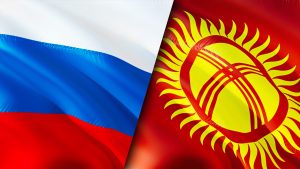In the aftermath of the March 22 attack on Crocus City Hall, a concert venue in Krasnogorsk on the outskirts of Moscow, which resulted in at least 139 deaths, Kyrgyzstan’s Ministry of Foreign Affairs issued a statement recommending that Kyrgyz citizens avoid travel to Russia.
The Islamic State Khorasan Province (ISKP) has reportedly claimed responsibility for the attack. ISKP has invested heavily in recruitment of Central Asians, and repeatedly highlighted Russia as a target.
According to the latest reports, Russian authorities detained at least 11 people on March 23 in connection with the attack. On March 25, four men were charged as the main perpetrators of the attack – 32-year-old Dalerjon Mirzoev, 30-year-old Saidakram Rajabalizoda, 25-year-old Faridun Shamsiddin, and 19-year-old Muhammadsobir Faizov – with Russian media identifying them as Tajik citizens. Three other people were sent to pre-trial detention on March 25 – Aminchon, Dilovar, and Isroil Islomov (two brothers and their father) – in connection with the car the attackers allegedly fled in. Their citizenship has not been reported.
Another man, Alisher Kasimov, who authorities claim rented an apartment to one of the alleged attackers, was sent to pre-trial detention on March 26. Kasimov, according to Asia-Plus is a native of Kyrgyzstan, but Kloop reported, citing the Kyrgyz Foreign Ministry, that he renounced his citizenship in 2014.
In the 1990s Tajikistan signed a dual-citizenship agreement with Russia; Turkmenistan is the only other Central Asian country with such an agreement with Moscow. So it is possible that the attackers referred to as Tajik citizens may be dual citizens. Other Central Asians who acquire Russian citizenship are not recognized as dual citizens by the Russian government – dual citizenship is also not officially recognized by the governments of Kyrgyzstan, Kazakhstan, or Uzbekistan.
Russia represents a major destination for Central Asian migrant workers and is of particular importance to the economies of Kyrgyzstan and Tajikistan. According to a December 2023 World Bank report, remittances to Tajikistan are equivalent to 48 percent of the country’s GDP (about $5.7 billion in 2023); remittances to Kyrgyzstan are equivalent to about 21 percent of GDP (about $2.6 billion in 2023). Millions of Central Asians travel to Russia each year, many of them to work in seasonal jobs.
The Kyrgyz Foreign Ministry’s recommendation – a warning, really – asks citizens “who do not have compelling reasons to travel to the Russian Federation” to refrain from doing so. Furthermore, it urges “citizens who have two or more administrative offenses during their previous stay on the territory of the Russian Federation” to refrain from traveling in order to avoid being denied entry. The ministry also urgest Kyrgyz citizens in Russia to avoid crowded places and carry their identity documents, and documents attesting to the legality of their presence in Russia, with them.
With the accusation of Central Asians as being involved in the attack, anti-migrant sentiments in Russia have flared. These sentiments are not new, but the recent tragedy has heightened tensions. Meduza collected several anecdotes illustrating this backlash, including people refusing to take cabs driven by Tajiks and threats against a barbershop where one of the alleged attackers may have worked. Furthermore, when the four alleged Tajik attackers appeared in court, they had clearly been subject to abuse, something Moscow does not seem at all bothered by. One man’s head was bandaged; an unverified video circulating on Russian social media of the attackers’ alleged confessions showing his ear being cut off by security officers.
Meanwhile, authorities in Tajikistan have reportedly detained relatives of the four alleged attackers for questioning. According to RFE/RL’s Tajik Service, “the mother, brother, two uncles, and other relatives of one of the accused gunmen – Saidakram Rajabalizoda – were taken away by police on the evening of March 25” as well as the head of the neighborhood where the family lived. “An unknown number of relatives of another of the suspected gunmen – Muhammadsobir Faizov – were taken from their homes in Dushanbe, neighbors told RFE/RL.”
Tajik authorities have made no statements about these detentions. The Tajik Foreign Ministry reported on March 25 that Tajik President Emomali Rahmon had a telephone conversation with Russian President Vladimir Putin. In the call Rahmon condemned the attack and reportedly said “terrorists have no nationality, no homeland, no religion.” Rahmon pledged cooperation on counterterrorism, but the statement did not acknowledge the reported Tajik citizenship of the attackers.
Update: After initial publication, other Central Asian states began issuing similar warnings, such as Uzbekistan on March 27.

































